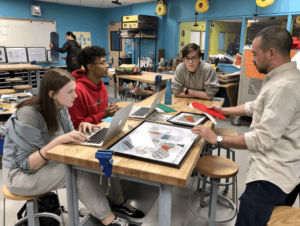What I’m Seeing: Productive Post-Secondary

Wow, the edtech space seems to have exploded. The number and quality of startups is remarkable as is the inflow of talent and investment. Over the next weeks I’ll discuss some of the emerging capabilities I’m seeing in these ten categories:
- Productive post-secondary: taking outcomes and value seriously
- Informal learning: anytime learning, often an alternative to formal post-sec
- Credentialing/skills verification: market signaling in post-sec, achievement recognition systems in K-12
- Coding: combinations of the first three aimed at writing code
- Financial aid: combating the difficulty and cost of aid
- Magical Math: hard to believe we learned math without this stuff
- Classroom practice: better, easier, more collaborative teaching
- Tools: productivity tools for teachers and kids
- Early learning: apps and better preschool
- Other stuff you may not have thought of
Productive post-sec. In response to the terrible combination of unchecked cost inflation and academic indifference to outcomes, the ROI on American higher is been plummeting. Student debt of $1 trillion now tops credit card debt. Weak job prospects and ridiculous prices are causing students to consider alternatives–and edupreneurs are delivering. Consider news of the last few weeks:
- Minerva, powered by $26M from Benchmark, announced today the intent to launch a better and more selective university than the Ivies. Ben Nelson has an impressive plan (that I reviewed last year). There is unquestionably room for him to deliver much better value than the Ivy League. He’ll soon have the interest of the global middle class. Texas A&M responded to Governor Perry’s call for a $10,000 degree with a $9,700 IT degree.
- University Now joins StraighterLine and other super-low cost post-sec. Look for the big guys and the community college down the street to look for ways to compete in the competency-based DIY space.
- E[nstitute] suggests that you skip college and go to work in a hot NYC startup. They got a little more HuffPo love today.
- The combination of startup-relevant topics, expert instructors, and great peer learning makes GeneralAssemb.ly an MBA killer and now they are online.
- Replacing Universities is idea #3 on Paul Graham’s list of Frighteningly Ambitious Startup Ideas. (More on this when we discuss credentialing).
The genie is out of the bottle. This is not a temporary budget crunch, state subsidies are not coming back. Alternative learning options are exploding–and they pay attention to outcomes and return on investment.
If you want an update on some of the disruptive drivers, read Christina Yu’s Technology Can Make Students More Intellectual.








0 Comments
Leave a Comment
Your email address will not be published. All fields are required.